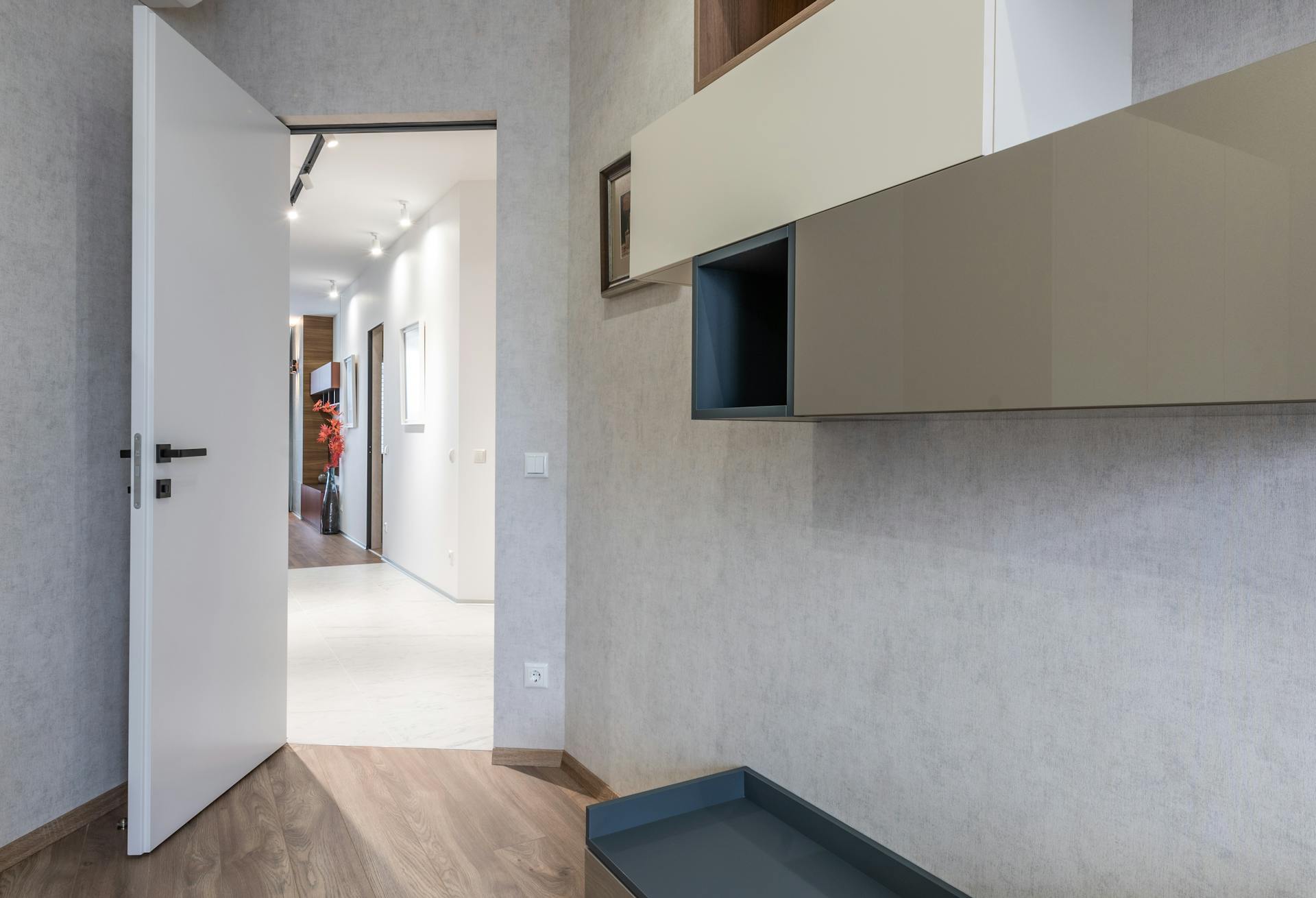
Defaulting on a Home Equity Line of Credit (HELOC) can have severe consequences, including immediate and long-term effects on your financial stability.
You'll likely receive a notice from your lender within 30 days of missing a payment, warning you of the potential consequences of default.
The lender can then accelerate the loan, meaning they can demand immediate repayment of the entire balance, plus any fees and interest accrued.
This can lead to foreclosure, which is a lengthy and costly process.
If the lender sells your home to satisfy the debt, you'll be left with little to no equity, and your credit score will likely take a significant hit.
What Happens When You Default
Defaulting on a HELOC can have serious consequences. You'll likely face severe penalties, including fees, credit score damage, and possible foreclosure.
Your lender may initiate foreclosure proceedings if you've used your home as collateral. This means they can take possession of your property and sell it to recover the debt.
Missing HELOC payments can also significantly reduce your credit score. In fact, defaults can stay on your credit report for seven years, making it harder to secure new credit or even find employment in some industries.
If you're struggling to make payments, your lender may offer options like forbearance or loan modification programs to help you avoid foreclosure.
Here's a step-by-step breakdown of what happens when you default on a HELOC:
- 1-2 months behind on payments: Lender will try to collect the debt and may offer options to get caught up on payments.
- 2-3 months behind: Lender will start direct contact with you and may offer options to avoid foreclosure.
- 3+ months behind: Lender will send a demand letter, followed by a notice of default, and may pursue foreclosure proceedings.
Keep in mind that lenders are more likely to foreclose if you have considerable equity in your home. However, if you're underwater, they may be less likely to pursue foreclosure due to the costs involved.
Consequences of Defaulting
Defaulting on a HELOC can have severe consequences, including suspension of further withdrawals, which can leave you without access to additional funds. Your credit score will also take a hit, affecting your ability to secure other forms of credit.
A default can cause your credit score to plummet, affecting your ability to secure other forms of credit, including loans and even car insurance rates. This can have a significant impact on your financial stability.
Some lenders offer a grace period, usually around 15-30 days, before considering a missed payment a default. However, it's crucial to consult your loan agreement for specific details as this varies by lender.
Here are some of the immediate consequences of defaulting on a HELOC:
- Suspension of further withdrawals
- Impact on credit score
These consequences can snowball into major challenges, including potential legal action from the lender, risk of foreclosure, and impact on co-signers or joint account holders. Your lender may resort to legal action to recover their money, which could involve a lawsuit, adding stress and legal fees to your already challenging situation.
Understand Consequences of Primary Mortgage Default
If you default on your primary mortgage, it can have serious consequences, including the risk of foreclosure on your home.
You're also at risk for defaulting on your HELOC, which can lead to foreclosure on your home as well. If you're unable to make payments on either loan, the bank could sell your home to recoup the funds for the missed payments.
It's essential to communicate with your lender as soon as possible if you're having trouble making payments. Lenders are often more willing to negotiate terms when you have open communication than once several months of payments have been missed.
Here are some potential consequences of defaulting on your primary mortgage:
- Potential legal action from the lender
- Risk of foreclosure on your home
- Impact on co-signers or joint account holders
These consequences can be devastating, so it's crucial to take proactive steps to avoid defaulting on your loans.
Credit Collection and Wage Garnishment
Defaulting on a HELOC can have severe consequences, including credit collection and wage garnishment. If you can't make payments on your HELOC, the original lender has the right to sell the loan off to another party, such as a credit collection agency.
Credit collection agencies may pursue defaulted debt for several years and even seek court-ordered judgments against debtors. These judgments can be used to garnish wages from those that fail to repay their debts.
If you're facing credit collection and wage garnishment, it's essential to understand your rights and options. You can try to negotiate with the credit collection agency or your lender to set up a payment plan.
Here are some key points to consider:
It's crucial to act quickly and take control of your financial situation. Ignoring the issue or hoping it will go away can lead to further complications and damage to your credit score.
Impact on Credit and Finances
Defaulting on a HELOC can have severe consequences on your credit and finances. Your credit score can take a significant hit, often declining drastically in a matter of moments. This can make it difficult to obtain credit in the future, with higher interest rates and additional fees.
Missing HELOC payments can lead to a default, which can stay on your credit report for several years. This can cause ongoing financial hardship and make it challenging to regain financial stability. A default can also lead to a lien being placed on your property, making it difficult to borrow against it again.
The consequences of defaulting on a HELOC can be far-reaching, affecting not only your credit score but also your financial stability. A lower credit score can indicate a higher risk to insurers, leading to increased insurance premiums. This can add to your ongoing expenses and make it even more challenging to manage your finances.
Here are some potential long-term repercussions of defaulting on a HELOC:
- Accumulation of debt and interest
- Difficulty obtaining credit in the future
- Loss of equity and financial stability
- Strained personal relationships
- Increased insurance premiums
It's essential to note that defaulting on a HELOC can have severe consequences, including foreclosure proceedings. Your lender may have the right to take legal action, including repossession of your home if you've used it as collateral. In some cases, your lender may also be able to take you to court in order to collect on any remaining balance that's still due.
Defaulting on a HELOC can result in a long and expensive legal process for you. Your lender may pursue more aggressive collection options, such as placing late fees, seeking judgments through civil litigation, and garnishing wages. It's crucial to take proactive steps to address any financial difficulties and avoid defaulting on your HELOC.
Defaulting on a HELOC
Defaulting on a HELOC can have severe consequences, including fees, credit score damage, and possible foreclosure. You'll face a breach of contract, and your lender will attempt to collect the debt.
Your lender will make several attempts to collect the debt before taking legal action to foreclose on your property. This means if you're only 1-2 months behind on your HELOC payments, you won't necessarily end up in foreclosure. However, failing to repay your HELOC can lead to foreclosure and a negative hit to your credit score.
You can expect to pay late fees, which are usually around 5% of the payment amount due, if you remain delinquent after the grace period has ended. Failing to make payments for longer than three months may prompt your home equity lender or HELOC program to take further action.
A HELOC default will significantly lower your credit score, which affects your ability to secure new credit, rent an apartment, or even find employment in some industries. Defaults usually stay on your credit report for seven years.
Here's a breakdown of the consequences of defaulting on a HELOC:
Recovering from Default
Defaulting on a HELOC is a serious setback, but it's not a life sentence. It's essential to take proactive steps to address the issue and rebuild your credit score.
Your credit report is a crucial document that affects many aspects of your life. Review it from all three major bureaus - Equifax, Experian, and TransUnion - and scrutinize them for any inaccuracies or outdated information. A single error could be pulling your score down, so make sure to dispute these inaccuracies.
To boost your credit score, consistently making on-time payments is a straightforward way. Your payment history constitutes 35% of your credit score, so use calendar reminders or financial software to help you stay on track.
Here are some approaches you can take to bring your credit back up:
- Paying bills on time
- Limiting new credit inquiries
- Working with a credit repair service
- Considering a secured credit card
These steps may take time, but they can help you reclaim your financial freedom.
What to Do
If you're facing the possibility of defaulting on a HELOC, it's essential to understand the consequences. Defaulting on a HELOC means you've failed to meet the loan repayment terms outlined in your agreement.
You could be charged with fees as a result of defaulting on a HELOC. Credit score damage is also a potential outcome, which can have long-term effects on your financial health.
To avoid foreclosure, consider seeking additional options. There are some potential solutions to consider that can help you make better choices for your financial future.
Defaulting on a HELOC is a breach of contract that can lead to serious financial repercussions.
Rebuilding Financial Health
Defaulting on a HELOC can feel like a major setback, but it's not a life sentence. You can pivot from this situation and move towards a more secure financial future.
Your credit score affects many aspects of your life, from loan approvals to employment opportunities. A single error on your credit report could be pulling your score down, so make sure to dispute any inaccuracies.
Making on-time payments is a straightforward way to boost your credit score. Your payment history constitutes 35% of your credit score, so consistently making on-time payments is crucial.
You can limit new credit inquiries to avoid decreasing your score. Every new credit application results in a hard inquiry on your credit report, which can decrease your score. Limit your applications for new credit, and when you do need a loan, shop around within a short period to minimize the impact.
Here are some steps to help you rebuild your financial health:
- Review your credit report from all three major bureaus: Equifax, Experian, and TransUnion.
- Pay your bills on time using calendar reminders or financial software.
- Work with a credit repair service if you're feeling overwhelmed.
- Consider a secured credit card to improve your credit score.
Rebuilding your credit after defaulting on a HELOC may take time, but it's possible to do and will help you reclaim your financial freedom.
Specific Situations
Missing a payment on a HELOC can be a stressful experience, but it's essential to understand the difference between missing a payment and defaulting on the loan.
Missing a payment is a lapse, but it's not automatically a default. Lenders usually offer a grace period before considering the loan in default.
The consequences of defaulting on a HELOC are severe and can be harder to reverse than missing a single payment. Defaults result in more severe penalties.
Junior Lienholder
A junior lienholder is a lender that holds a secondary position in the hierarchy of titles to a property. This typically means they are a home equity line of credit (HELOC) lender, not the primary mortgage lender.
If you default on your HELOC, the lender may foreclose on your home. This can lead to you losing your home to the bank.
The lender's position in the hierarchy of titles determines their eligibility to receive payment from the proceeds of foreclosure. If they hold a senior position, they will be paid first, and there may not be enough money left for junior lienholders.
You can lose your home if you don't pay your HELOC, and this will also negatively impact your credit score.
A lien may be placed against your property as soon as you default on your HELOC. This makes it difficult to borrow against that property again until you've paid off all your obligations in full.
Here are some possible steps a junior lienholder may take if you default on your HELOC:
- Enter into repayment agreements
- Charge off accounts
- Place late fees
- Seek judgments through civil litigation
- Garnish wages
Home Equity Loan vs Loan

A home equity loan and a HELOC are often confused with each other, but they're quite different.
A home equity loan is essentially a second mortgage with fixed interest for the term of the loan. This means you'll know exactly how much you owe each month, and it won't change.
A HELOC, on the other hand, is a revolving credit line with adjustable interest and variable minimum payment amounts. This can be both a blessing and a curse, as you may end up owing more than you anticipated.
While a home equity loan is a fixed amount, a HELOC is like a credit card - you can borrow and repay as needed, but be careful not to overspend.
The key difference between the two is the interest rate and payment structure. With a home equity loan, you'll know exactly what you're getting into, whereas a HELOC can be more unpredictable.
Homes with Higher Values

If your home is worth more than what you owe on your first mortgage, the home equity loan provider will likely initiate a foreclosure to recover the money it lent you.
This is because most home equity loans are recourse loans, meaning the creditor can pursue you for the total debt owed, even after selling the collateral.
The more money the second mortgage holder can potentially recoup from a foreclosure sale, the more likely it will take this path to recover its losses.
In other words, if your home is valuable enough, the lender will do whatever it takes to get its money back.
Key Information
Defaulting on a Home Equity Line of Credit (HELOC) can have serious consequences, but understanding the process can help you navigate the situation.
Foreclosure is a possibility if you default on a HELOC, but the lender's decision to foreclose depends on the amount of equity in your home. The more equity you have, the more likely the lender will choose to foreclose.

If you're underwater on your home, meaning you owe more on the mortgage than the home is worth, the lender can sue you personally for the money you owe.
Contacting your lender immediately is crucial if you're having trouble making payments. A HELOC goes into default after 2 months of non-payment, and once in default, lenders can try to obtain payments via a credit collection agency, have your wages garnished, or foreclose on your property.
Here are the possible consequences of defaulting on a HELOC:
- Foreclosure
- Wage garnishment
- Credit collection agency
If foreclosure isn't a viable option, the lender will likely try to sue you for the debt. Uncollectable debt is treated as ordinary income by the Internal Revenue Service (IRS).
Sources
- https://www.investopedia.com/mortgage/heloc/cant-pay-back/
- https://www.figure.com/blog/what-happens-if-i-can-t-make-payments-on-a-heloc/
- https://www.figure.com/blog/what-happens-to-my-heloc-if-i-default-on-my-mortgage/
- https://www.moneygeek.com/heloc/default-consequences/
- https://www.investopedia.com/can-home-equity-loan-enter-foreclosure-5235302
Featured Images: pexels.com

